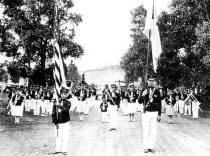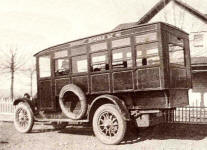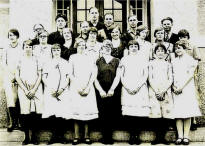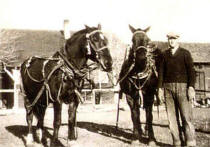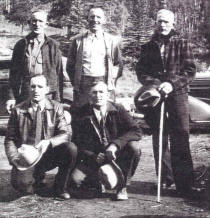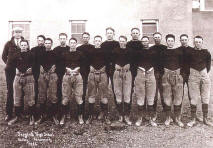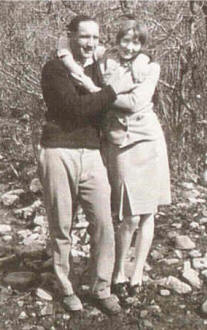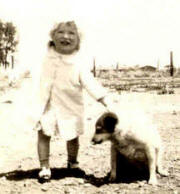| Franklin Pierce Worley | ||
| July 1, 1909 - September 16, 1980 | ||
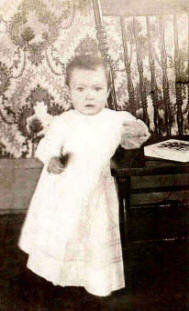 Frank
|
Franklin Pierce Worley was born July 1, 1909 in Ollie, Keokuk County, Iowa to George and Laura Worley, the youngest of four sons. As a small child, Frank was the darling of the whole family – they all spoiled him rotten. At age four he had a beautiful fair complexion. Since he was the youngest, his three older brothers babied him, teased him, taught (or tried to teach) him things, whether they were good or bad. Grandpa Worley was a religious man, and undoubtedly the family asked the blessing at each meal, and George read his Bible regularly. They attended Evangelist religious meetings regularly. The economics of the times required that they all worked hard to maintain a living on the farm.
Following World War I after Orville returned from the Army in France, and Gerald from the Navy, the Worleys sold their farm in Iowa and moved to the San Luis Valley, Colorado. Frank and Charlie entered school at Sargent (Frank in the fourth grade and Charlie in the eighth grade, eventually dropping out after three years.)
(From here story is by Frank’s daughter Frances) “As a young boy Dad raised pigs and entered them in the Rio Grande County Fair, doing well with the awards. As he grew and entered high school, he was a strong, active athlete, and was a member of the football team and band. He had friends who were full of fun and mischief. It was at this time that he joined the crowd and started smoking and drinking, which I am sure did not set well with Grandpa Worley. It is easy to imagine the discipline imposed upon him for such actions. One time, I remember hearing, he had stayed out all night, got home just before daylight, and was met at the door by ‘Pa’ Worley. He was told to turn right around and get to work shoveling out the manure in the barn. There was no relief for Dad that day. It was a hard day’s work without any sleep. It is doubtful that evening found him ready to go out to party! This and other examples of discipline carried over into his own fatherhood, when an infraction of his rules was met with appropriate action.
Sometime during these high school days he met Iola Koch, who went to Monte Vista High School. They dated and played with other young people their ages. Snapshot pictures show them having good times in the mountains and driving cars. Some of Dad’s friends in the Sargent District were Clifford Kistler, Speed Deutsch, Gale Sloan…
As I remember hearing the story, some sort of difficulty at school resulted in his being dropped from the football team for a short time. He was also a bus driver – it is hard to believe the school was very strict about the driving ability and safety, when I used to hear about those old black top-heavy buses turning corners on two wheels. Dad used to mention Mike Deutsch, the bus mechanic at Sargent, speaking in admiration of him. He had sons, one Dad’s age (Speed – now where did that nickname come from?) At any rate, there seemed to be a problem at school, so Frank quit school in 1927. His family was very disappointed that he would not be the only high school graduate from their family.
Dad and Mother decided to get married. They lived with Grandpa and Grandma Worley. A baby girl was born January 24, 1929 in the family home. Shortly after this they moved to a farm of their own, crop sharing. The houses available on these farms were not much more than shelters – no electricity, therefore no indoor bathrooms, a few rooms and a path to the outdoor privy. The farm crops were potatoes, pigs, peas and some grains. Baked potatoes and boiled eggs were a staple diet for suppers, along with chicken and noodles!
This life must have been hard for a town girl to adjust to. Mother had not grown up with a surplus of money (her father Jacob Koch died of a heart attack, leaving her mother Susanna to make a living for her two daughters by taking in sewing.) Growing up, Mother had not had to butcher chickens (wring their necks or chop off their heads, scald them and pick the feathers, take out the insides, and clean them up to either sell or to cook), or to grow a garden for the vegetables.
Church was not a part of his life – ever. I guess he had had too much entertaining visiting preachers, evangelistic meetings, prayers, and church attendance when he was growing up. It obviously did not rub off on this brash youngest son of George and Laura. This is not to say that he was not Christian in his relationships with friends and neighbors. Orville and Charlie eventually realized a need for religious affiliation. Gerald married Vada David, who was a strong church goer, and he attended Sunday church services with her. The Worley boys were kind, friendly, and had soft hearts if there was a real need, and they would do a kind deed for others.
As Dad grew older, he moved from one farm to another, trying to better his financial position. Many farmers rented land to farm, and it was ‘old renter out the back door of the tenant house and new renter in the front door on March 1 of each year.’ As he farmed the many years, he often hired out as a day laborer. He worked for Mr. A. I. (Alexis – Lex) Moloney in his strawberry fields east of Monte Vista on Sherman Avenue. Another time he swallowed his pride and lived in a labor house on the Schultz farm (on the three-mile north road, five miles east of the Gunbarrel), working for Mother’s mother’s family, the Andy Schroffs, as a hired man. He also worked for his brother Charlie on the West Farm setting fence posts by lantern light! These had to be the low points in his life.
Finally through crop-sharing Norman Chapman’s land (four miles west on the eight mile road), he accumulated farm machinery and a bank account.
About 1939 electricity and wall telephones came to the farms because of the Rural Electric Association (the Public Service Company had run a line from Monte Vista to Center earlier in the 1930’s, but this did not serve the ‘hinterland’ farmers). Electricity made lots of changes in our lives – no more walking the path through the chicken yard to the outhouse, no more carrying in water from the well, and no more water boxes to keep food cool. The pantry where the water box had been became a BATHROOM with luxurious fixtures. We bought a refrigerator, and had a sink in the kitchen and running water. Electricity powered a light bulb in the ceilings for light. We even had a radio to listen to! The telephone hung on the wall and had six or seven parties, with that many rings to designate the recipient of a call. Parties on this line had to yield to others when emergencies occurred. Life did indeed improve!
Finally Dad accumulated enough money to make a payment on a farm three-fourths mile south of Sargent. He bought this quarter section from Cecil Phillips. We moved into the story and a half house about 1942. From here on, life improved for Mother and Dad financially. Dad rented land from different owners, including Fassetts, Warren Clark and others either on a cash or crop share basis.
It was in the winter of 1949 that plans were made to remodel the house they had lived in. They no longer needed the attic bedroom for their daughter, so the cut off the top of the house and added on to the north side, making two downstairs bedrooms with a nice bath between and a larger living room. They moved into town temporarily and lived in an apartment while this renovation was being done – an expensive avoidance of the inconvenience of living in a mess, but Dad absolutely refused to live in the mess and noise of hammers and saws and plaster dust.
During the following years, Dad joined the Masonic Lodge in Monte Vista, then received the 32nd Degree in Pueblo, became a member of the Sand Dunes Shrine, and Jesters. These last two gave him much pleasure and pride in his later years. He had earned a reputation as being a good farmer, a sociable coffee drinker every day in town, and a good manager. If his hired man (he had progressed to farming from his car) needed help in repairing a machine, Dad would bring out the parts if the man could replace them. If not, the machinery was taken to town or to Alvie Boyce’s machine shop at Dunul for repair. Dad was a ‘gentleman farmer’ by now – he did not want to get his hands, clothes or new white leather gloves dirty or greasy.
Dad enjoyed helping people financially or otherwise, but it was never done openly. People seldom knew who the benefactor was, and the public certainly knew nothing. I know of cases where he made small loans, and though expected them to be repaid, he did not press the issue, or make it known if he was not repaid. He always carried several hundred dollar bills in his billfold – and often insisted on paying large party checks in cash!
About a year of Bob and I working at our jobs in Denver, Dad approached us with an offer to come to the Valley to farm with him. Bob was to be the ‘hired hand’ and do the work, since he didn’t have the finances to invest in machinery. That is what happened – apparently Bob was happy to have this chance to get out of the monthly paycheck situation that an electrician was limited to in Denver. It was astute of Dad to hold off a year following the wedding to make this offer, though I suspect he had thought of it all along and was eager to make the offer sooner. At last he had a son to farm with him!
It was in the spring of 1951 that they started the partnership (not official, or legal partnership but spoken agreement). A hand shake with Dad was as good as a binding document. The second year of farming, he offered to help the McCullough’s buy a farm. By the time the land was finally paid for, Bob and I felt we had paid several times the original price. It was not a gift from Frank Worley, by any means, and we did have a pride in believing that nothing had been given free. It did make us appreciate what we had acquired. Dad was a harsh partner, not letting anything come too easy, though he had a heart of gold. I suspect he felt it was his favor to require us to earn everything we gained – a matter of pride. And I think he was proud, too.
Probably one of the happiest moments of his life was when his first grandchild was born, and then the second and then the third! He had a secure family lineage now, as well as little ones to play with. At first he was shy about holding the babies, for fear they would break, but he soon got over that.
Finally, in 1963, he and his son-in-law, Bob, decided to build a potato warehouse and market the crop themselves, rather than pay other warehouses to do it. This became Worley and McCullough, Inc. Again Dad was the boss, the salesman, and the manager, with Bob doing the maintenance and farming, as well as helping run the sorting operation of the warehouse.
Dad was more or less idle during the growing season, and maybe he became bored with the coffee trips twice a day. When he was asked to fill the tem of George Milliken as Rio Grande County Commissioner, he consented. It satisfied that little bit of ego he had lurking in his personality – the hidden desire for power, and service to his community. He served the remainder of that term, and won the next election on his own. But because of his impatience with governmental interference from the State of Colorado, the bureaucracy involved, and failing health, resigned in the middle of his term. He had served the county well, but couldn’t handle being told by the state what to do with the county welfare system. He felt strongly about people getting out and working rather than expecting a handout. He was released from this job with regret, admiration and respect of his co-commissioners.
From then on his health deteriorated – he had a heart attack, ulcer, and emphysema. Dad and Mother went to Arizona for a short time during the winters, and later, for the whole winter (they bought a house in Sun City), and they finally they had to stay there all year because Dad could not tolerate the altitude change for just a few months. By this time, he was an old man, consumed with bad health and trying to stop that infernal smoking that he had started as a brash young man. He enjoyed playing poker at the men’s clubs in Sun City until the smoke became impossible for him to tolerate. Then he sat and watched television much of the time. Mother acclimated well in this life – playing bridge and golf, and being a good neighbor.
Mother’s death was, of course, a blow. She had been his help mate, his housekeeper, social partner, nurse and finally his greatest loss. He had been so wrapped up in his own health all these last years that he hadn’t realized it was taking a toll on her health, too. She had given a bridge party the night before and was in the laundry room washing up some things. Apparently she was attacked with a heart seizure and called and called to him. He remembers hearing her, but assumed she was talking to the neighbors over the back fence, and thought nothing of it. Finally, he missed her returning to the kitchen and went looking for her. He found her slumped on the floor of the laundry room, dead. November 3, 1979. What anguish he must have felt at not answering her cries for help! Neighbors came and helped him call the necessary people. He sat in his chair awaiting his daughter to come from Colorado to be with him. Through the final arrangements, he was inconsolable. A memorial service was held in Sun City for her many friends. When it was time to take Mother home to Colorado, Dad persuaded his doctor to admit him to the hospital to be cared for medically, physically and emotionally. There was no way he could stand the trip to Colorado. This was his way of solving a problem that could have caused much concern while his family returned home for the service. It was a thoughtful thing he did.
During the next weeks while I was with him, he interviewed several housekeepers, and finally accepted one. She stayed until the middle of May. Dad had told her from the very beginning he wouldn’t need her after June 1. He was going home to Colorado. He flew home in the Cessna 210, Lynn and I with him. Bob drove the car back, loaded with clothes, silverware and other things we didn’t want to leave in Arizona.
Dad declared he was not going back to Arizona – he was staying in Colorado. Early that summer, he enjoyed being home. He was able to drive to town for coffee with his old friends and ‘check the crops’. He stayed with Bob and me, installing a TV on the wall so he could spend time on the bed.
As the summer progressed, he became weaker and more frail. He was unable to drive to town, riding occasionally with Bob. Then finally he didn’t get out at all. He didn’t even feel like checking the crops.
Harvest time came – grain, potatoes, and finally time came for Dad to go ‘home’. He said he took too much blood thinner accidentally, and decided when it was time to go to the hospital.
His last two weeks were not pleasant, but at least he was still in control of his life and destiny.
Franklin Pierce Worley died September 16, 1980 at 71 years of age. He had lived a good life, quietly doing good for others and being proud of the family he left behind." Child of Frank and Iola Worley: Frances Marie Worley was born in Monte Vista, Colorado January 24, 1929
|
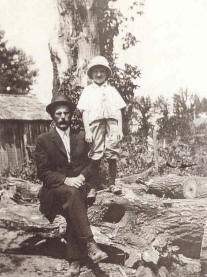 GeorgeWorley & Frank in Iowa
|
|
|
|
|
 Bob & Frances' Wedding |
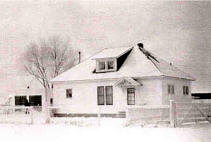 Frank & Iola's House circa 1950 |
|
|
|
|
|
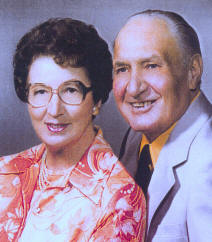 Frank& Iola's 50th Wedding Anniversary |
||
